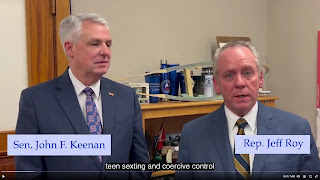Providing accurate and timely information about what matters in Franklin, MA since 2007. * Working in collaboration with Franklin TV and Radio (wfpr.fm) since October 2019 *
Thursday, May 15, 2025
State Representative Jeffrey N. Roy Announces Passing of House Budget
Thursday, March 20, 2025
State Representative Roy Promoted to House Leadership Position
Sunday, October 13, 2024
Medway Democratic Town Committee has resource pages for November 2024 election
 |
| Medway Democratic Town Committee has resource pages for November 2024 election |
Friday, September 13, 2024
Lt. Gov Driscoll joins State Rep. Roy to Kick off 2024 Re-Election Campaign
Sunday, August 18, 2024
Massachusetts Legislature Enacts Comprehensive Midwifery And Maternal Health Bill
 |
| Massachusetts Legislature Enacts Comprehensive Midwifery And Maternal Health Bill |
Wednesday, July 24, 2024
State Rep Jeff Roy provides update on MA House climate legislation
"The House passed legislation accelerating a responsible, innovative and equitable clean energy transition. The legislation overhauls outdated siting, permitting, and interconnection processes to empower the Commonwealth to deploy clean energy projects and infrastructure to meet its net-zero goals and create better outcomes for communities, clean energy companies, and utilities.It further harnesses innovative technologies to power our green transition such as advanced metering, fusion energy, battery storage, grid-enhancing technologies and the buildout of fast-charging infrastructure and meter socket adapters to support wide scale adoption of electric vehicles and heat pumps.This involves generating and procuring more clean power, solving interconnection issues, and incentivizing consumers and businesses to adopt green technologies.You can read more about the legislation at https://jeffreyroy.com/2024/07/23/house-passes-critical-energy-reforms-to-meet-2050-net-zero-climate-goals/"
 |
| State Rep Jeff Roy provides update on MA House climate legislation |
Saturday, May 25, 2024
Representative Roy: "Massachusetts House Passes Landmark Veterans Legislation"
 |
| Representative Roy: "Massachusetts House Passes Landmark Veterans Legislation" |
Monday, April 29, 2024
State Rep Roy on the MA House Budget passing (video)
Via our State Representative Jeff Roy:
"The House concluded budget deliberations on the FY25 budget last night (4/26/24).
I was proud to deliver local aid to Franklin and Medway that will assist the Franklin Food Pantry, the Medway Village Food Pantry, the Franklin Performing Arts Company, the SAFE Coalition, the Franklin Downtown Partnership, and the Medway Community Farm. I was also happy to file an amendment that added $500,000 to the Genocide Education Trust Fund.
In the video below, I highlight all of the environmental and energy provisions in the budget. It was an amazing budget in challenging times and I am grateful for the leadership of Speaker Ron Mariano and Ways & Means Chair Aaron Michlewitz for making it all happen. "
Sunday, April 21, 2024
Episode 42 starts with eclipse highlights and legislative seminar before discussing headlines (audio)
FM #1176 = This is the Franklin Matters radio show, number 1176 in the series.
This session of the radio show shares my conversation with Ted McIntyre, Franklin resident and climate activist. We met to record in the Franklin TV & Public Radio studio on Tuesday, April 16, 2024.
We continued making sense of climate on an almost extemporaneous discussion similar to what we recently had. Starting with highlights from Ted’s experience of the eclipse, and with my highlights from the Citizen Legislative Seminar where I spent 2 days in State House.
NY Attorney General sues meat producer https://www.theguardian.com/us-news/2024/feb/29/new-york-jbs-climate-lawsuit
Meat a contributor https://www.theguardian.com/environment/2024/apr/04/us-banks-sabotaging-own-net-zero-plans-by-livestock-financing-report-claims
80/20 rule strikes again https://www.theguardian.com/environment/2024/apr/04/just-57-companies-linked-to-80-of-greenhouse-gas-emissions-since-2016
How to spot five of the fossil fuel industry’s biggest disinformation tactics https://www.theguardian.com/us-news/2024/apr/14/climate-disinformation-explainer?CMP=share_btn_url
This discussion continues our journey understanding the MA roadmap toward net zero and while it helps me “make sense of climate”, we hope it helps with your understanding as well.
If you have climate questions or Franklin specific climate questions, send them in and we’ll try to answer them in a future session.
The conversation runs about 43 minutes. Let’s listen to my conversation with Ted.
Audio link -> https://franklin-ma-matters.captivate.fm/episode/fm-1176-making-sense-of-climate-42-04-16-24--------------
** See the page that collects all the “Making Sense of Climate” episodes -> https://www.franklinmatters.org/2022/02/making-sense-of-climate-collection.html
--------------
We are now producing this in collaboration with Franklin.TV and Franklin Public Radio (wfpr.fm) or 102.9 on the Franklin area radio dial.
This podcast is my public service effort for Franklin but we can't do it alone. We can always use your help.
How can you help?
If you can use the information that you find here, please tell your friends and neighbors
If you don't like something here, please let me know
Through this feedback loop we can continue to make improvements. I thank you for listening.
For additional information, please visit www.franklin.news/ or www.Franklinmatters.org/
If you have questions or comments you can reach me directly at shersteve @ gmail dot com
The music for the intro and exit was provided by Michael Clark and the group "East of Shirley". The piece is titled "Ernesto, manana" c. Michael Clark & Tintype Tunes, 2008 and used with their permission.
I hope you enjoy!
------------------
You can also subscribe and listen to Franklin Matters audio on iTunes or your favorite podcast app; search in "podcasts" for "Franklin Matters"
Sunday, March 24, 2024
Migrant crisis: State Senate votes to limit time in family shelter
"As the state burns through the hundreds of millions already set aside to fund Massachusetts’ emergency shelter system, the state Senate late Thursday voted to inject millions more into the system, and limit the amount of time homeless families, including migrants, can stay.The 32-8 vote, which happened shortly after 9 p.m. Thursday night, sets the stage for what will likely be a contentious debate with the House, which passed its own version earlier this month.The proposal is part of a spending bill meant to buoy the strained shelter system through the end of the fiscal year, and help fund it into 2025. While the Senate proposal diverges from the House’s bill on some key details, both chambers are now united behind the concept of restricting, for the first time since the inception of Massachusetts’ right-to-shelter law, how long the state should provide a place to sleep for homeless families."
 |
| The Senate legislation differs in many ways from the House’s proposal |
"As Massachusetts struggles to find housing for an influx of migrants, a Globe analysis of state data finds that few wealthy communities are hosting emergency shelters for homeless and migrant families while the bulk are in middle-income cities and towns.Of the 94 communities hosting emergency shelters, more than half have a median household income below $100,000, while just nine of those communities — including Acton, Concord, and Lexington — have household incomes above $150,000.The state says its process for placing shelters is driven by the availability of space and factors such as their proximity to critical services such as public transportation.But many communities say they are having trouble providing all the resources people need, such as transportation and translators, and worry the strain on their limited resources will reach a breaking point."
Friday, January 12, 2024
Massachusetts House unanimously passes bill to prevent abuse and exploitation, enhance protections for survivors (video)
The Revenge Porn bill has passed the House! Now what? Well, the Senate has to vote, then @MassGovernor @maura_healey will need to sign it into law. Thank you to Rep. @jeffroy for all your hard work! #MAPoli https://t.co/BV4WV0UEQV (Follow link to view video)Shared from -> https://twitter.com/SenJohnFKeenan/status/1745543605391909036
 |
| SenJohnFKeenan & Rep. @jeffroy |
Wednesday, December 6, 2023
Via CommonWealth Beacon: State budget for FY 2023 completed (finally); Revenues down for November and YTD
"Mass. tax revenues take dive in November"
"MASSACHUSETTS TAX REVENUES took a dive during November and are running 4.3 percent below forecasted levels through the first five months of the fiscal year, reinforcing concerns that state government needs to slow its pace of spending.The Department of Revenue reported on Tuesday that tax collections in November totaled $2.25 billion, nearly 11 percent below the state forecast and 5.5 percent less than last year. Through the first five months of the fiscal year, revenues are running $627 million below the forecast used to draft this year’s budget and 1 percent more than the same period last year.Adding to concerns, the state’s tax revenues in November were not affected by the passage of a major tax cut in October. That tax cut should start having an impact on state tax revenues starting in December or January, officials said."
Continue reading the article -> https://commonwealthbeacon.org/government/state-government/mass-tax-revenues-take-dive-in-november/
"Dems return to Beacon Hill in force, pass stalled spending bill"
"Instead of using parliamentary rules to block or delay action on the bill, as Republicans in the House did, the Senate Republicans struck a deal with Democratic leaders. In return for the Republicans agreeing not to delay action on the bill, the Senate Democrats supported a Republican motion to suspend the Legislature’s joint rules so the bill could be taken up in a formal session and be debated. The motion wasn’t embraced by the House, so it didn’t go anywhere, but it was a moral victory for the Senate Republicans and it allowed the bill to move quickly to enactment, which is what the Democrats wanted.
Senate President Karen Spilka called it a “win-win for everybody.”
The end result was the long overdue spending bill was sent to Gov. Maura Healey, who signed it immediately. All the parliamentary maneuvering didn’t change anything, but it captivated Beacon Hill for nearly a week in the middle of a holiday recess. The drawn-out process was mostly about optics and placing blame for delays that held up raises for public sector unions, disaster relief, and funding for the stretched-thin emergency shelter program."
| The golden dome of the State House. (Photo by Andy Metzger) |





